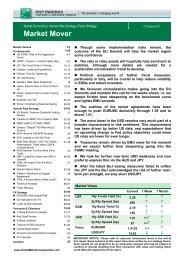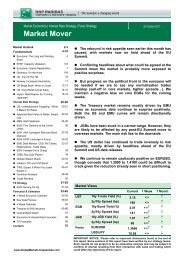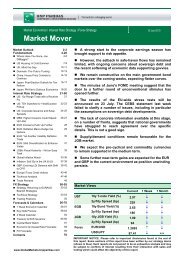Market Economics | Interest Rate Strategy - BNP PARIBAS ...
Market Economics | Interest Rate Strategy - BNP PARIBAS ...
Market Economics | Interest Rate Strategy - BNP PARIBAS ...
You also want an ePaper? Increase the reach of your titles
YUMPU automatically turns print PDFs into web optimized ePapers that Google loves.
Retail sales data from month to month have been, as<br />
usual, very volatile. But for Q1 as a whole, sales are<br />
down by just shy of 1% q/q in real terms. This is the<br />
fifth contraction in the past six quarters and the<br />
biggest since Q1 2009. Another q/q contraction in<br />
private consumption in Germany beckons: Q1 would<br />
be the third in succession, with the y/y rate of change<br />
to fall further into negative territory (-0.4% in Q4)<br />
given the unfavourable base effects related to the<br />
boost to spending from car purchase incentives in Q1<br />
2009.<br />
The weakness of consumer spending is a further<br />
reason to expect poor GDP figures in Q1 but history<br />
tells us that the German economy can grow without<br />
much of a contribution from private consumption –<br />
we discuss this in more detail below.<br />
2010 adjustment<br />
The Bundesbank Monthly Report for April talked of a<br />
‘slight decline’ in GDP in q/q terms in Q1. The Buba’s<br />
estimate, like our own, is hampered by the absence<br />
of the full set of ‘hard’ activity data for Q1 (production<br />
and trade figures for March are due imminently). The<br />
distortions due to the weather compound the difficulty<br />
in making an accurate forecast. Still, on the basis of<br />
the information available, we now forecast a q/q fall<br />
in Q1 GDP of 0.2%.<br />
But, in conjunction with the downward revision to Q1,<br />
we are revising up our estimate for Q2. Initially we<br />
had forecast a rise of 0.6% q/q but we now look for<br />
an increase in excess of 1% q/q.<br />
This necessitates an adjustment in our forecast for<br />
2010 as a whole. We had initially expected growth in<br />
Germany of 1.7% in 2010: our revised forecast is for<br />
growth of 1.5% (Table 1). This is a bit more optimistic<br />
than the forecast from the European Commission,<br />
updated this week, of 1.2%.<br />
We have adjusted our eurozone GDP forecast profile<br />
to reflect the changes made to the German forecast<br />
and some changes to our forecasts for other member<br />
states. The net result is that we have revised down<br />
our forecast for Q1 GDP growth in the eurozone to a<br />
rise of 0.1% q/q from 0.3% q/q initially. A rebound is<br />
assumed for Q2, of 0.5% q/q. The forecast for 2010<br />
growth is trimmed from 1.0% to 0.9%. This is in line<br />
with the estimate from the European Commission.<br />
Germany to outperform<br />
A key aspect of our forecasts is that while we expect<br />
Germany to underperform the eurozone average in<br />
Q1, we remain of the view that it should outperform<br />
thereafter. Germany is forecast to grow faster than<br />
the eurozone in the subsequent quarters and in 2010<br />
and 2011 overall.<br />
The likelihood of outperformance beyond Q1 is borne<br />
out by the leading indicators. The composite PMI for<br />
Germany is well above that for the eurozone and is<br />
indicative of q/q growth of around 1%. The German<br />
economic sentiment index compiled by the European<br />
Commission has also been outperforming. Its rise in<br />
April, of over four percentage points, was the second<br />
largest in the series’ history.<br />
The fundamental picture also favours the German<br />
economy outperforming. It is best placed to capitalise<br />
on the pick-up in global activity, while it is likely to be<br />
much less affected by the sovereign debt crisis in the<br />
eurozone. The widening of sovereign yield spreads<br />
represents a tightening of monetary and financial<br />
conditions for all countries other than Germany which<br />
has seen its long-term interest rates fall.<br />
This is not to suggest that Germany does not have<br />
problems of its own. It clearly does. One is the effect<br />
of recent developments on key trading partners in the<br />
eurozone. Another is weak consumer demand. But<br />
there are some grounds for cautious optimism on the<br />
latter. The surveys of spending intentions amongst<br />
German households have fared much better than in<br />
the eurozone on average over the past few months.<br />
The fiscal stance is helpful, as is the performance of<br />
the labour market.<br />
Even if the survey data do not translate into much of<br />
a pick-up in actual spending, as has been the case in<br />
the past, then Germany can still prosper without a big<br />
contribution to growth from private consumption. In<br />
the period from Q4 2005 to Q1 2008, for example,<br />
when the last expansion really got going, there was a<br />
negligible increase in German private consumption: it<br />
rose by a meagre 1.6% cumulatively. But GDP<br />
expanded by around 8% cumulatively over the same<br />
period, driven in large part by a near-25% rise in<br />
exports. The external sector is likely to remain the<br />
pivotal influence on Germany’s growth outlook.<br />
Table 1: GDP Projections<br />
2009 2010 2011<br />
2009 2010 (1) 2011 (1) Q1 Q2 Q3 Q4 Q1 (1) Q2 (1) Q3 (1) Q4 (1) Q1 (1) Q2 (1) Q3 (1) Q4 (1)<br />
Germany<br />
% q/q - - - -3.5 0.4 0.7 0.0 -0.2 1.2 0.6 0.3 0.3 0.4 0.5 0.6<br />
% y/y -4.9 1.5 1.8 -6.7 -5.8 -4.8 -2.4 0.9 1.7 1.6 1.9 2.4 1.6 1.5 1.8<br />
Eurozone<br />
% q/q - - - -2.5 -0.1 0.4 0.0 0.1 0.5 0.2 0.1 0.3 0.3 0.4 0.5<br />
% y/y -4.0 0.9 1.2 -5.0 -4.9 -4.1 -2.2 0.4 1.1 0.9 1.0 1.2 1.0 1.2 1.6<br />
Source: <strong>BNP</strong> Paribas<br />
Ken Wattret 7 May 2010<br />
<strong>Market</strong> Mover<br />
19<br />
www.Global<strong>Market</strong>s.bnpparibas.com
















